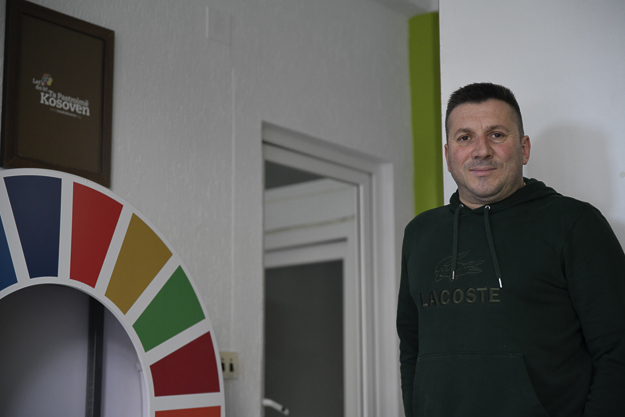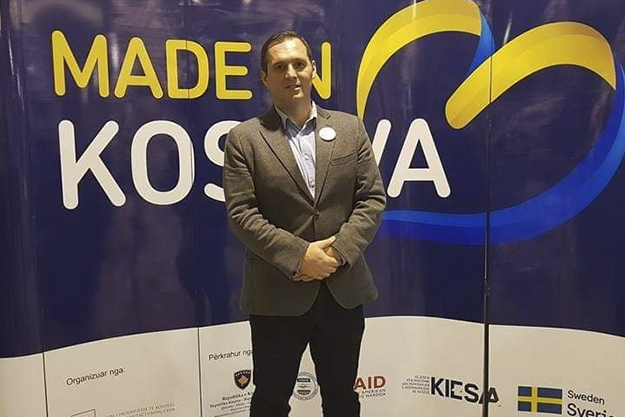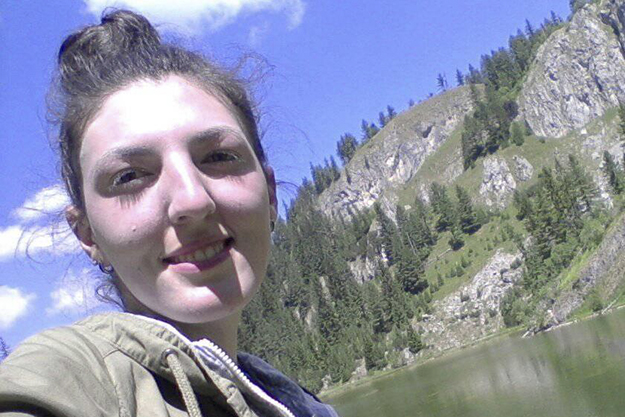In a Prishtina supermarket, a customer in the fruit section picks up an apple and a banana, and after weighing them, casually asks for the fruits to be put in a single plastic bag. Two pieces of fruit in a bag, that made sense.
To his surprise, the staffer sticks the price tags on two different big plastic bags, separating the fruit. He mumbles something about an instruction from the manager to avoid putting different products in a single bag, it having caused problems before when paying the cashier.
Neither of them seemed to be concerned about the effect that plastic bags have on the environment.
This, despite multiple studies showing that the harm plastic bags cause to the environment is widespread and long lasting.
“The effect of plastics on the environment is crushing, filling the stomach of animals while other smaller creatures are caught in them.”
Endri Haxhiraj, Institute for Environmental Policy
The plastic shopping bag appeared in 1965 and was patented by the Swedish company Celloplast; the inventor wanted to create a reusable object that would help save the environment. Quickly after that, it spread and was soon a widely used product in Europe and beyond.
But, the reputation of plastics began to fall in the 1970s with the increase of waste and the concern about the effects that it has on human health and the environment.
Findings have shown the presence of plastics — a synthetic compound made from carbon-based materials — even in the most remote parts of the ocean, including different types of single-use plastics like food packaging, bottles, straws, cups and containers dating back to the ’60s. Microplastics particles have even been found in the snow and ice layers of the Arctic.
Scientists have also found extensive plastic waste in oceans and rivers, some of it going back more than 50 years.
“The effect of plastics on the environment is crushing, filling the stomach of animals while other smaller creatures are caught in them,” says Endri Haxhiraj from the Institute for Environmental Policy in Tirana.
And it’s not only animals that are ingesting the plastic particles. Microplastic particles are already a regular presence in human bodies.
A study commissioned by the World Wildlife Fund and conducted by the University of Newcastle in Australia in 2019, concluded that a person nowadays could be consuming 2000 plastic pieces a week, an equivalent to eating a credit card a week, or 21 grams of plastic per month.
Scientists also now think that the particles are being carried by the atmospheric winds and there’s a chance that we are breathing them in.

Luan Hasanaj, director of Let’s Do It Kosova, says that many people are willing to voluntarily help clean Kosovo so they might also be willing to give up plastic bags. Photo: Atdhe Mulla / K2.0.
A single-use, thin, non-biodegradable plastic bag can take up to 500 years to degrade while only having a useful lifetime for 12 minutes, on average. These types of plastic bags are the ones most environmentalists are against.
And activists in Kosovo point out that despite a relative lack of attention to the issue locally, these problems are not just an issue facing foreign countries.
“Kosovo businesses and houses produce around 600,000 tons of waste a year, and plastic is the most problematic,” says Granit Gashi from the environmental group GAIA, adding that single-use plastics are a particular concern.
Luan Hasanaj, director of the environmental protection organization Let’s Do it Kosova, points out that the impacts are highly visible, with rivers in particular being highly polluted with plastics and illegal landfills full of plastic regularly being burnt.
Banning the bag
According to the United Nations Environmental Programme (UNEP), as of July 2018, 127 countries have banned or restricted plastic bags in some way. These regulations range from obliging the consumer to pay for a bag at the checkout to banning the production, import and selling of plastic bags altogether.
Kenya has one of the most drastic plastic bag bans on the planet. Since 2017, anyone caught making or selling thin, single-use plastic bags is subject to a prison sentence or a fine of up to $40,000 (about 37,000 euros).
The European Union has taken steps to ban plastic bags and other single use plastics like straws and cups, while in the U.S., the states of New York, Oregon and California have now banned plastic bags with some exceptions. In Ireland, a plastic bag charge levied in 2002 is reported to have led to a 95% decrease in plastic bag usage.
Within the region, Albania currently requires vendors to charge customers for plastic bags in grocery stores and markets and has introduced a ban on thin, single-use, non-biodegradable bags. Albania was the first country in the region to ban non-biodegradable bags in 2018.

Kujtim Gjevori, who owns Kosovar plastics factory SCAMPA, says Kosovo isn’t ready for a plastic bag ban. Photo courtesy of Kujtim Gjevori.
Some experts have criticized plastic bag bans, noting that there are issues with using alternative bags since both paper and cotton production require large amounts of water. A few studies have also shown that one unintended consequence of bag bans is that people have bought more plastic trash bags.
Many experts suggest that a bag tax is more productive than a ban and extends the life of the bag; almost all environmental experts agree that bags, of any kind, should be reused as often as possible.
What has Kosovo’s government done?
In March 2019, then Minister of Environment, Fatmir Matoshi, said that his ministry was searching for a feasible model for phasing out plastic bags that would work in Kosovo, but discussions with businesses were at an early stage.
In December 2019, during the “For a Healthy Life without Plastics” conference organized by the Kosovo Center for Business Support, Matoshi said that “plastics are the environment’s biggest enemy,” emphasizing the damage caused by plastic bags and bottles.
But the situation appears not to have hardly moved on in practice and institutions have seemed to be largely passive in this process.
Ibrahim Balaj from the Department of Environmental Protection at the Ministry of Infrastructure and Environment, says that the ministry has been working to draft and amend Administrative Instruction no. 11/2013 that currently regulates the production, import and standards of plastic bags in Kosovo. The amended instruction would regulate the circulation and the forms of taxation for plastic bags for producers and importers.
“We have been consulting with businesses; they ask to postpone a ban on plastic bags for at least 10 years.”
Ibrahim Balaj, Department of Environmental Protection
Until now, the ministry’s goal has been to “limit the usage of plastic bags” and to stop the import of non-degradable plastic materials, including bags. But businesses so far haven’t been on the same page.
“We have been consulting with businesses; they ask to postpone a ban on plastic bags for at least 10 years,” Balaj says.
Kujtim Gjevori owns the SCAMPA plastics factory and also represents other plastics producers in Kosovo, lobbying the government on their behalf.
“We should be careful with laws that are brought here from EU countries, because we are creating more problems than giving solutions,” he says. “If we bring their law here, it’s not going to work.”
Gjevori points out that alternatives to plastics raise their own problems, and suggests that caution should be exercised when intervening in the plastics industry, which he says is “estimated to be one of the best developing industries.”
“The solution as we see it,” Gjevori says, “is to work on awareness so that people ensure [that the bags are] properly disposed of. Then we should invest more in recycling and later, after five or 10 years, start producing bags from an organic base, like potatoes, something that has just started in some EU countries.”
The Kosovo Environmental Strategy 2013-2022 lists the taxing of plastic materials, namely bottles and bags, as a priority in terms of managing solid waste. But this problem is not addressed anywhere else in the strategy, and plastics are only named twice in the 60-page document.
NGOs working in the environmental sector, such as the Institute for Development Policy (INDEP) in Prishtina, have complained about the lack of government action on plastic bags and other environmental issues.
“We think that plastic bags should be [regulated] in a package with some other environmental issues,” says executive director Burim Ejupi. “Over the last two years we worked on the Industrial Waste Law. The Ministry of Environment over the last three years has had no particular agenda for environmental policies.”
Learning from the neighbor?
In the summer of 2018, Albania banned the production and import of all plastic bags thinner than 35 microns in an effort to cut down on the use of plastics.
Consumers were required to buy plastic bags to carry their shopping if they didn’t bring their own. In Albanian stores, a plastic bag now costs between 5 and 15 Albanian Lek (about 10 to 15 euro cents).
But, the enforcement of the decision is not going well.
“The fruit and vegetable open markets still use the banned plastics.”
Mihallaq Qirjo, Resource Environmental Center, Albania
The Director of the Resource Environmental Center in Albania, Mihallaq Qirjo, says that the law was well enforced in the first three months after being introduced, but later banned plastic bags were back in stores.
The main problems with the enforcement, according to Qirjo, consist of a lack of monitoring from the institutions, while the production of plastic bags that are now illegal has reportedly continued within the country. He says that institutions have also failed to assess the level of quality of the bags that are allowed to be used.
“The fruit and vegetable open markets still use the banned plastics,” he says, pointing out that the situation is better in bigger stores where inspection by the institutions is easier.
How ready are we to change?
Raising awareness about the impact of plastic and waste in the ecosystem has proven to be a global challenge.
Experts tend to agree that the change in the way plastics and other harmful materials are used should begin with proactive campaigns by governments and other institutions globally, but that individual citizens can play a crucial role by changing their daily routines and habits.
K2.0 conducted a simple, non-scientific poll on Instagram measuring what individual actions people were prepared to take to protect the environment; 85% of respondents said that they were ready to give up plastic bags rather than giving up their car. In another poll, 60% said that they would be ready to give up plastic bags compared to an alternative option provided to plant trees.
“If the government starts behaving, everyone will follow.”
Luan Hasanaj, Let's Do It Kosova
Qirjo says that in Albania, people who live in urban areas, like Tirana, have begun to think more about the environment, mostly because harm to the environment is having a larger effect on their wellbeing.
“There are people here in Tirana that don’t use plastic bags,” he says. “But we’re talking about a small number of people and that’s not enough.”
Meanwhile, Hasanaj says that people in Prishtina have proven to be willing to help when it comes to activities and work that is related to the environment.
“Every time we do a cleaning activity a lot of people show up to help,” he says. “If the government starts behaving, everyone will follow.”
People like Jerinë Musliu, a recent law graduate, have already begun making the change on their own.
“I don’t use plastic bags and I’m now used to taking things using my own bag, but the supermarkets have to become accustomed to customers who don’t want to use plastic bags,” she says. “Once, I couldn’t take two bananas from a supermarket because a worker there told me that without a bag he wasn’t allowed to sell them to me.”

Some individuals, such as Jerinë Musliu, have begun refusing plastic bags at stores. Photo courtesy of Jerinë Musliu.
But in general, Hasanaj says that people tend to care more about what belongs to them, rather than the public space or property. He thinks that this comes from the fact that the institutions until now haven’t done enough to address issues related to the environment.
“Everyone keeps their yard clean, but the roads are full of garbage,” Hasanaj says.
Meanwhile, Endri Haxhiraj says people need to start thinking about getting rid of a lot of harmful habits in order to protect their habitat and live a healthier life.
“If we want to live on this planet, there’s no other way,” he says. “Or humanity disappears completely.”K
Feature Image: Atdhe Mulla / K2.0.




